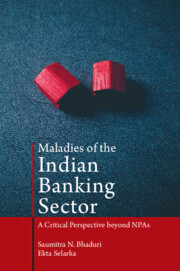Book contents
- Frontmatter
- Dedication
- Contents
- List of Figures
- List of Tables
- Foreword
- Acknowledgements
- 1 Prologue
- 2 The Indian Banking Sector: A Brief History
- 3 The Index of Credit Allocative Efficiency
- 4 Macroeconomic Analyses of Bank Credit Misallocation in the Indian Corporate Sector: Investigation of Pro-cyclicality
- 5 Determinants of Bank Credit Misallocation: Firm-level Analysis
- 6 Allocative Efficiency of Bank Credit and Firm Performance
- 7 Credit Reallocation by Indian Banks in the Aftermath of the Global Financial Crisis
- 8 The Zombie Story: Credit Boom and the Rise of Zombie Firms in the Indian Economy
- 9 Epilogue
- Bibliography
- Index
6 - Allocative Efficiency of Bank Credit and Firm Performance
Published online by Cambridge University Press: 27 September 2022
- Frontmatter
- Dedication
- Contents
- List of Figures
- List of Tables
- Foreword
- Acknowledgements
- 1 Prologue
- 2 The Indian Banking Sector: A Brief History
- 3 The Index of Credit Allocative Efficiency
- 4 Macroeconomic Analyses of Bank Credit Misallocation in the Indian Corporate Sector: Investigation of Pro-cyclicality
- 5 Determinants of Bank Credit Misallocation: Firm-level Analysis
- 6 Allocative Efficiency of Bank Credit and Firm Performance
- 7 Credit Reallocation by Indian Banks in the Aftermath of the Global Financial Crisis
- 8 The Zombie Story: Credit Boom and the Rise of Zombie Firms in the Indian Economy
- 9 Epilogue
- Bibliography
- Index
Summary
The availability of investable funds at the disposal of firms has drawn considerable attention from business practitioners and researchers. Interestingly, the issue gets more complicated if the investable funds are not generated from firms’ internal sources and instead raised from external sources like debt and equity. Any form of external capital comes with a set of expectations from the investors and creditors in terms of firms’ ability to meet the obligations, generate better returns, and enhance future performance. Particularly, if the funds come in the form of bank credit, firms need to improve their performance downstream to service the debt obligation. In an efficient economic system, a firm is expected to borrow strictly according to its needs, and the funds are expected to flow from poor quality firms to good ones. However, it is often argued that if firms receive credit disproportionate to their needs, the possibility of firms mismanaging the funds amplifies, leading to future underperformance.
Therefore, an empirical exercise is undertaken in this chapter to explore the consequences of the allocation efficiency of bank credit on firm performance. Specifically, we seek answers to the following questions. First, does the misallocation of credit impact a firm's future performance? Second, more importantly, will misallocated bank credit reduce firms’ performance downstream?
Literature throws some insights into the role of access to bank credit and the performance of firms. Several studies examine if access to credit, specifically bank debt, improves the productivity or performance of firms (Schiantarelli and Sembenelli, 1999; Gatti and Love, 2008; Rizov and Zhang, 2014). For example, Manaresi and Pierri (2018) provide evidence for the supply of banks’ credit affecting the productivity of a large number of Italian firms. The study shows that credit supply boosts productivity growth, and this effect is persistent. Further, access to bank credit is also found to encourage the new firms to grow and innovate (Ayyagari, Beck, and Demirgüç-Kunt, 2007); Claessens and Laeven, 2005; Koeda and Dabla-Norris, 2008). Therefore, firms seem to have incentives in borrowing from the bank when access to other external sources of finance is difficult and the supply of bank credit is not constrained.
- Type
- Chapter
- Information
- Maladies of the Indian Banking SectorA Critical Perspective beyond NPAs, pp. 124 - 136Publisher: Cambridge University PressPrint publication year: 2022



